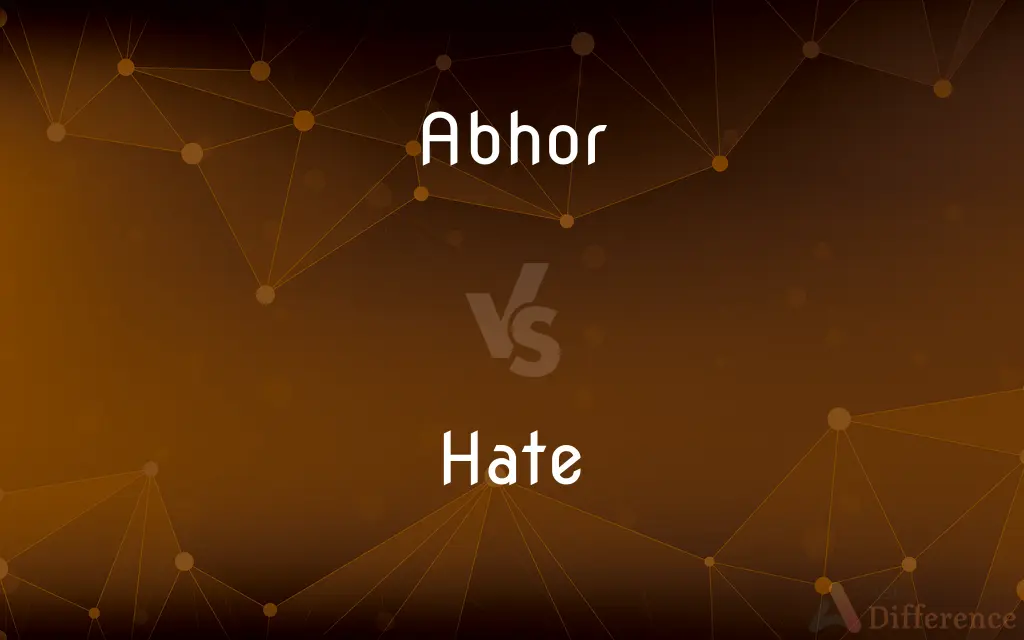Abhor vs. Hate — What's the Difference?
By Tayyaba Rehman & Fiza Rafique — Updated on April 6, 2024
Abhor implies a deep repugnance and moral disdain, while hate focuses on intense dislike or hostility.

Difference Between Abhor and Hate
Table of Contents
ADVERTISEMENT
Key Differences
Abhorrence and hate both describe negative feelings toward someone or something, but abhorrence carries a stronger connotation, often involving a sense of moral disgust or detestation. In contrast, hate is a more general term for intense dislike or aversion. The distinction between the two lies in the depth and sometimes the reasoning behind the feeling: abhorrence is deeply rooted in one’s values or ethics, whereas hate can stem from a broader range of causes, including fear, jealousy, or personal aversions.
While abhorrence is typically reserved for things that one finds morally reprehensible or utterly repulsive, hate can apply to anything from minor irritations to profound animosities. For instance, one might abhor practices considered inhumane or unjust, reflecting a moral stance, while hating something can be less about moral judgment and more about personal feelings.
The intensity of the emotion also differs. Abhorrence implies a level of intensity that is profound and often tied to one’s core values or beliefs, making it a less frequently employed term in everyday language. Hate, while still strong, is used more commonly and can vary in its degree of intensity and the commitment of the person feeling it.
Another aspect to consider is the expression of these emotions. Abhorrence, because of its moral and ethical implications, often leads to a desire to distance oneself from or oppose the abhorred act or entity. Hate, on the other hand, can manifest in a broader range of behaviors, from avoidance to active hostility or aggression.
The societal and cultural context can influence the interpretation and acceptance of these emotions. Abhorrence, with its moral undertones, might be seen as a justified or understandable reaction to violations of societal norms or ethics. Hate, given its broader application and potential for destructiveness, is more likely to be scrutinized and often discouraged in social discourse.
ADVERTISEMENT
Comparison Chart
Connotation
Deep moral disgust or detestation
Intense dislike or hostility
Basis
Rooted in values or ethics
Can stem from a variety of personal or emotional reasons
Intensity
Profound, tied to core beliefs
Strong but can vary in degree
Typical Context
Used for morally reprehensible actions or beliefs
Applies to a wide range of dislikes, from minor to severe
Expression
Leads to a desire for distance or opposition
Can manifest as avoidance, hostility, or aggression
Societal Perception
Often seen as a justified reaction to ethical violations
Viewed with caution due to potential for negative actions
Compare with Definitions
Abhor
Feeling of revulsion or loathing.
They abhor the idea of waste and always recycle.
Hate
A strong aversion.
She hates the cold weather and prefers the tropics.
Abhor
To reject vehemently.
She abhors the use of violence in resolving conflicts.
Hate
Emotional animosity.
He harbors a deep hate for his rival.
Abhor
To regard with disgust and hatred.
She abhors cruelty in any form.
Hate
Intense dislike or hostility.
He hates injustice and works to combat it.
Abhor
A deep moral aversion.
He abhors corruption and strives for transparency in government.
Hate
To dislike something or someone very much.
She hates getting up early for work.
Abhor
Moral detestation.
They abhor practices that harm the environment.
Hate
Loathing or disdain.
They share a mutual hate for dishonesty.
Abhor
To regard with horror or loathing; detest
"The problem with Establishment Republicans is they abhor the unseemliness of a political brawl" (Patrick J. Buchanan).
Hate
To feel strong dislike for or hostility toward
Rivals who hate each other.
Abhor
(transitive) To regard (someone or something) as horrifying or detestable; to feel great repugnance toward.
Hate
To feel dislike or distaste for
Hates washing dishes.
Hates to get up early.
Abhor
To fill with horror or disgust.
Hate
To be disinclined (to do something) out of politeness or a need to apologize
I hate to interrupt, but can I ask you a quick question?.
Abhor
(transitive) To turn aside or avoid; to keep away from; to reject.
Hate
To feel hatred.
Abhor
To protest against; to reject solemnly.
Hate
Intense animosity or dislike; hatred.
Abhor
To feel horror, disgust, or dislike (towards); to be contrary or averse (to); construed with from.
Hate
An object of hatred.
One of my pet hates is traffic wardens.
Abhor
Differ entirely from.
Hate
Hatred.
He gave me a look filled with pure hate.
Abhor
To shrink back with shuddering from; to regard with horror or detestation; to feel excessive repugnance toward; to detest to extremity; to loathe.
Abhor that which is evil; cleave to that which is good.
Hate
(Internet slang) Negative feedback, abusive behaviour.
There was a lot of hate in the comments on my vlog about Justin Bieber from his fans.
Abhor
To fill with horror or disgust.
It doth abhor me now I speak the word.
Hate
(transitive) To dislike intensely or greatly.
Abhor
To protest against; to reject solemnly.
I utterly abhor, yea, from my soulRefuse you for my judge.
Hate
(intransitive) To experience hatred.
Do not fear; he who fears hates; he who hates kills. — attributed to Gandhi
Abhor
To shrink back with horror, disgust, or dislike; to be contrary or averse; - with
Which is utterly abhorring from the end of all law.
Hate
To have a great aversion to, with a strong desire that evil should befall the person toward whom the feeling is directed; to dislike intensely; to detest; as, to hate one's enemies; to hate hypocrisy.
Whosoever hateth his brother is a murderer.
Abhor
Find repugnant;
I loathe that man
She abhors cats
Hate
To be very unwilling; followed by an infinitive, or a substantive clause with that; as, to hate to get into debt; to hate that anything should be wasted.
I hate that he should linger here.
Hate
To love less, relatively.
Hate
Strong aversion coupled with desire that evil should befall the person toward whom the feeling is directed; as exercised toward things, intense dislike; hatred; detestation; - opposed to love.
For in a wink the false love turns to hate.
Hate
The emotion of hate; a feeling of dislike so strong that it demands action
Hate
Dislike intensely; feel antipathy or aversion towards;
I hate Mexican food
She detests politicians
Common Curiosities
What does it mean to hate something?
To hate something means to have an intense dislike or hostility towards it.
Can you feel both abhorrence and hate for the same thing?
Yes, it's possible to feel both if something invokes intense dislike and also contradicts your moral or ethical values.
What is abhorrence?
Abhorrence is a feeling of deep disgust and moral repulsion towards something.
Is abhorrence stronger than hate?
Yes, abhorrence is generally considered stronger because it involves moral disgust and detestation.
Why is abhorrence considered a moral emotion?
Because it is typically elicited by actions or behaviors that are seen as ethically wrong or morally repugnant.
How do people typically respond to things they abhor?
People often seek to distance themselves from or actively oppose what they abhor, due to its contradiction with their values.
Is it possible to stop hating something?
Yes, through understanding, empathy, and sometimes reconciliation, it is possible to overcome feelings of hate.
How can hate affect personal relationships?
Hate can strain or destroy personal relationships, leading to conflict and estrangement.
Can societal norms influence what we abhor or hate?
Yes, societal and cultural values can significantly influence our feelings of abhorrence or hate towards certain actions or behaviors.
Can hate lead to aggressive behavior?
Yes, hate can manifest in aggression, hostility, or other negative behaviors towards the object of hatred.
Is it normal to abhor certain actions or beliefs?
Yes, abhorring actions or beliefs that contradict one's ethical or moral standards is a natural response.
Can the intensity of hate change over time?
Yes, the intensity of hate can change depending on personal growth, new experiences, or changes in perspective.
How should one deal with feelings of abhorrence towards societal issues?
Constructive actions, such as advocacy, education, and engaging in dialogue, can be productive ways to address the root causes of abhorrence.
Are there healthy ways to deal with hate?
Yes, understanding the root causes of hate, communication, and seeking therapeutic support can be healthy ways to cope.
How do expressions of hate differ from expressions of abhorrence?
Expressions of hate can range from avoidance to aggression, while abhorrence often leads to a principled stance or opposition.
Share Your Discovery

Previous Comparison
Dralon vs. Acrylic
Next Comparison
Dhow vs. BoatAuthor Spotlight
Written by
Tayyaba RehmanTayyaba Rehman is a distinguished writer, currently serving as a primary contributor to askdifference.com. As a researcher in semantics and etymology, Tayyaba's passion for the complexity of languages and their distinctions has found a perfect home on the platform. Tayyaba delves into the intricacies of language, distinguishing between commonly confused words and phrases, thereby providing clarity for readers worldwide.
Co-written by
Fiza RafiqueFiza Rafique is a skilled content writer at AskDifference.com, where she meticulously refines and enhances written pieces. Drawing from her vast editorial expertise, Fiza ensures clarity, accuracy, and precision in every article. Passionate about language, she continually seeks to elevate the quality of content for readers worldwide.














































